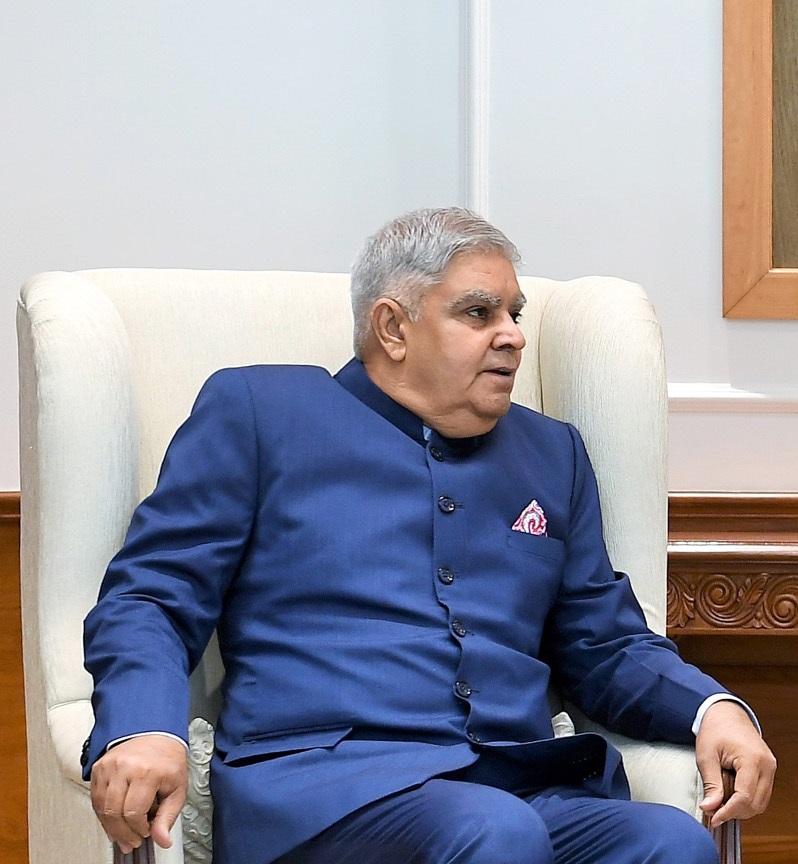VP Jagdeep Dhankhar Questions Preamble Changes, Echoes Ambedkar’s Vision
Calling the amendment a “nasoor” (festering wound) and an act of sacrilege, Dhankhar said that the Constitution’s soul was “trampled during the darkest period of Indian democracy.”

- Country:
- India
In a powerful and thought-provoking address, Vice-President Shri Jagdeep Dhankhar today raised fundamental concerns about the alteration of the Preamble to the Indian Constitution, characterizing the 42nd Constitutional Amendment of 1976—which introduced the terms “Socialist,” “Secular,” and “Integrity”—as a move that distorted the very soul of the Constitution.
The remarks were made at the Vice-President’s Enclave during the formal presentation of ‘Ambedkar’s Messages’, a compilation of quotes and reflections by Shri D. S. Veeraiah, former MLC from Karnataka. The event served as a platform for the Vice-President to delve deeply into constitutional philosophy, the Emergency era, and the enduring relevance of Dr. B.R. Ambedkar’s legacy.
Preamble: The Soul of the Constitution
“The Preamble is not changeable. It is the seed of the Constitution. It is its soul,” Shri Dhankhar declared. He emphasized that India remains the only country where the Preamble of the Constitution has undergone modification—done during a time when the very pillars of democracy were under siege.
Referring to the 42nd Amendment passed during the Emergency (1975–77), he noted that the changes were made when fundamental rights were suspended, and opposition leaders were imprisoned, rendering the constitutional process devoid of true democratic participation.
“We changed something that emanates from ‘We the People’ when those very people were in darkness—bleeding in heart and soul,” he lamented.
Echoes from Judicial Wisdom
Shri Dhankhar invoked landmark Supreme Court rulings to back his assertions:
-
Kesavananda Bharati v. State of Kerala (1973) — A 13-judge Constitution Bench that defined the “basic structure doctrine” of the Constitution.
-
IC Golaknath v. State of Punjab (1967) — Where a larger Bench reflected on the sanctity of the Preamble.
He quoted several celebrated justices to emphasize that the Preamble is neither ornamental nor optional, but a guiding compass for the entire constitutional framework.
“Justice H.R. Khanna rightly said the Preamble indicates the source of the Constitution—the People of India,” he stressed. “Justice Hidayatullah called the Preamble the nutshell of the Constitution’s ideals and aspirations.” “Justice Hegde and Justice Mukherjee said it is unalterable—changing it is like shifting a building’s foundation from its top floor.”
Calling the amendment a “nasoor” (festering wound) and an act of sacrilege, Dhankhar said that the Constitution’s soul was “trampled during the darkest period of Indian democracy.”
Dr. Ambedkar: A Visionary Beyond Time
Lauding Dr. B.R. Ambedkar, the chief architect of the Constitution, Shri Dhankhar said, “Dr. Ambedkar must never be seen as just a politician—he was a statesman, a visionary, and a civilizational icon.” He referred to Ambedkar’s final address to the Constituent Assembly on 25th November 1949, describing it as a message that must be framed and read daily by every Indian.
“Ambedkar warned us: India has lost independence once through betrayal from within. Will history repeat itself?” the Vice-President reminded the audience.
Quoting further, he cited Ambedkar’s apprehension about caste, creed, and political division overriding national unity. Ambedkar’s stirring call for “India first, India last, and nothing but Indians” was highlighted as a beacon of national integrity.
Ambedkar’s Messages: A Guide for Contemporary India
Receiving the book ‘Ambedkar’s Messages’, Shri Dhankhar expressed hope that it would percolate down to every Indian household, particularly among youth and children, and more so among legislators and policymakers, who bear the greatest responsibility for preserving democratic values.
“Ambedkar lives in our hearts and minds—his words resonate in our soul,” he said.
He encouraged parliamentarians and public servants to internalize Ambedkar’s values, reflect on his warnings, and defend constitutional morality against political and ideological expedience.
A Call to Preserve Constitutional Sanctity
The Vice-President concluded with an appeal to preserve the unaltered wisdom of the Constitution’s framers and warned against ideological encroachments masked as legal amendments.
“Every addition to the Preamble during Emergency was not just unlawful—it was an existential threat to the idea of Bharat,” he said. “We must not allow our temples of democracy to be ravaged by disruption and ignorance. They are sacred spaces.”
In an era where debates on constitutional identity, judicial activism, and national values are intensifying, Vice-President Dhankhar’s address stands as a compelling reminder of the need to respect the foundational principles laid down by the framers of the Constitution—especially when those principles are being contested or forgotten.










